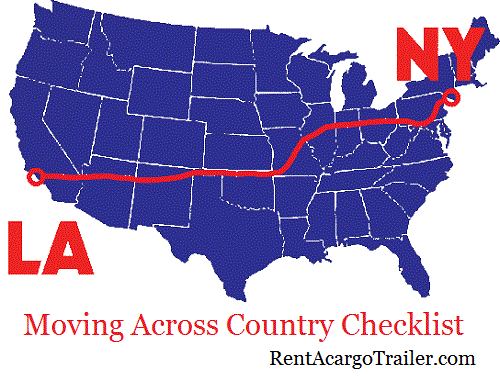
Rent a Cargo Trailer One Way
Moving out-of-state or cross-country may require the use of a one-way trailer.
This is a unique and convenient service provided by trucking/moving companies and most trailer rental stores. Right now, you may be wondering to yourself, ‘what exactly is a one-way trailer rental?
What is a one-way trailer rental? This type of rental allows you to pick up a trailer at one location and drop it off at another. Some moving companies provide this service with different sizes and types of units available.
You must inquire in advance if this option is available and not just assume it is.
Now that you know what a one-way trailer rental is, let’s take a closer look at this in more detail below. We’ll discuss who rents one-way trailers and how much it costs.
We’ll also explore whether it’s cheaper to rent one-way or round trip, if extra insurance is required for one-way rentals and what companies provide this service.
So, if you’re ready to learn more about renting a one-way cargo trailer, then let’s get to it!
Who Rents One Way Trailers?
Trailer rentals are popular with trucking and/or movies companies and as well as most trailer rental stores. It’s important to note, however, that not all businesses will allow one-way moves.
You can usually rent the trailer for a day but must return it to the same location. This is commonly referred to as an in-town rental.
If you’re looking to move cross-country and want to rent a one-way trailer, you must inquire and verify with the company beforehand that this service is indeed available to the general public.
Do not assume that all trailer rental places allow this option.
A few companies that provide one-way trailer rental services include:
- U-Haul International Inc.
- Penske Truck Leasing Co.
- Budget Truck Rental LLC
- Some local trailer rental companies. (call to verify)
For more information on the terms and conditions regarding one-way trailer rentals with these acclaimed moving and travel companies, check out their websites online or call their customer service inquiry line.
Find a cargo trailer rental company in your state by using our state listing page here: Rent a Cargo Trailer State Listing
How Much is it to Rent a One-Way Trailer?
Prices for renting a one-way trailer vary, depending on the following:
- The type and size of trailer needed
- The travelling distance necessary
- The length of time required
Each company will set its own rates and it’s up to you to find out the necessary information in advance. You’ll likely need to sign an agreement/waiver and pay a deposit fee up-front.
Prices are also dependant upon whether (or not) you need to rent a truck one-way as well as a trailer.
Is it Cheaper to Rent Trailers One Way or Round Trip?
In most cases, it’s likely cheaper to rent a trailer one-way rather than round-trip. With U-Haul, for example, there usually isn’t a change for mileage with a one-way rental but you are also required to stay below a specific number of miles.
For a round-trip rental, you must pay for mileage accumulated on the return trip, which is approximately $2 per mile. This can add up to a significant amount of money, depending on how far you go and how long it takes you to get there. (Of course this is for a truck rental)
What is the Best Way to Tow a One-Way Trailer, with My Truck?
In most cases, towing a one-way trailer is permitted by most companies that provide this service to their customers.
Some businesses, however, will only allow you to tow their trailers with their rental trucks. It’s your responsibility to inquire about this before entering into a rental agreement.
If you intend to tow a one-way trailer with your own vehicle, you must ensure that it has the proper hitch system necessary to transport the unit safely.
Read the rental agreement carefully to verify that your car, truck or SUV meets the required standards and is indeed approved to tow the equipment.
If your vehicle does not have a hitch system, then you must follow the owner’s manual for details on how to correctly install the proper-sized hitch.
For more information, see the subheading below entitled What Size Ball Hitch do I Need to tow a Trailer?
What Size Ball Hitch do I Need to tow a Trailer?
The standard size ball hitch is about 2 inches in diameter. Most trucks come equipped with this size, unless you intend to use a bigger truck which may have a hitch around 2 5/16 inches.
If you plan to tow a U-Haul trailer with your truck for a one-way trip, you must have the proper hitch system and adequate lighting connections.
How Can I Safely Tow a Cargo Trailer?
Safety is the #1 priority when it comes to towing a cargo trailer. Be sure to drive at a reduced speed while towing – going no faster than 55 miles per hour is recommended.
Always keep a safe distance between you and the vehicle ahead – at least five car lengths, as heavier loads require more time and space to stop.
Check the tires in advance (and along the way) to ensure they’re fully inflated.
How Much is it to Rent a U-Haul Trailer One Way?
Renting a one-way U-Haul trailer costs approximately the same amount as an in-town rental, which is anywhere from $60 – $75.
The pricing details will be listed in the contract as well as the return location address and/or a phone number to determine an appropriate drop-off location.
Why Does U-Haul Allow Extra Time with a One-Way Rental?
Oftentimes U-Haul will give you more days than you need with a one-day rental.
The reason for this is safety. The company wants to provide its customers with ample time to reach their destination safely.
Though there is no discount for ‘unused’ days, U-Haul encourages renters to return the trailer as soon as possible. This not only alleviates parking issues but also reduces potential liability for the equipment.
Do I Need Extra Insurance to tow a cargo trailer?
Extra insurance is an option provided by most trailer rental companies and covers potential damages to both the towing device and the trailer itself.
Although its not required in most cases, U-Haul for example, states right on their website that ‘many personal auto policies do not cover rental trucks or trailer rentals.’
Therefore, it’s recommended that you purchase the additional Safe Move or Safe Tow Damage Protection insurance option.
Whether you choose to or not, you should check with your auto insurance provider before entering into a trailer rental agreement. Ask any and all questions pertaining to your specific plan, just to be safe.
Can I Rent a U-Haul in One State and Return it in Another?
With most one-way trailer rentals, you can pick-up the unit in one city or state and return it in another. The return location or address will often be included in your rental agreement contract.
If no address is given, then the company will likely provide a phone number in which to arrange a mutually acceptable drop-off spot.
What are Some One Way Trailer Rental Companies Near Me?
Finding one-way trailer rentals is easy. U-Haul, for example, provides one-way trailer rentals to over 20,000 locations across the United States and Canada.
This makes it convenient for you to plan your move while saving you both time and money in the long run!
Moving Across Country Checklist

Before any major event in life we should take every chance we can to be prepared. If you have more than 3 this to remember it’s a good idea to have a checklist. Check out: Chelsea’s across country checklist
Conclusion
To conclude, a one-way cargo rental allows you to pick up a trailer at one location and drop it off at another. This service is provided by moving truck companies and some trailer rental stores.
Different sizes and types of trailers are usually available for customer convenience. You must inquire upfront if this option is indeed available and not just assume it is.
Happy trails!
Disclaimer:
U-Haul® is a registered trademark of U-Haul International, Inc. Penske® is a registered trademark of Penske Truck Leasing Co., L.P. Budget® is a registered trademark of Budget Truck Rental, LLC. Use of third-party trademarks or registered trademarks does not imply any affiliation with or endorsement by such third party.


